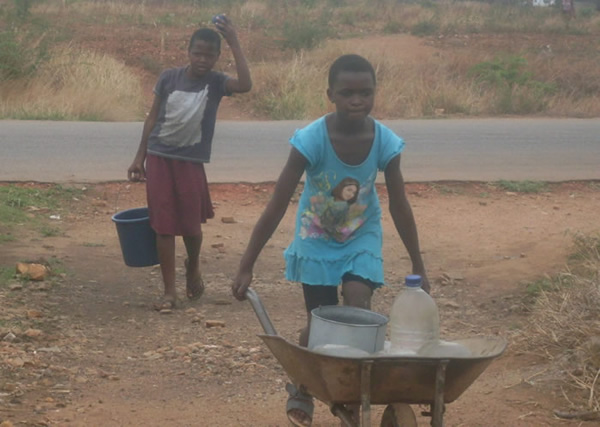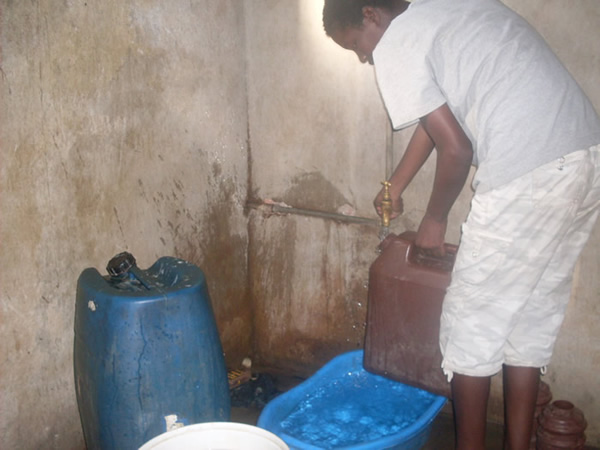| |
Back to Index
Where's
the water? Stories from Bulawayo - Page 2
Marko
Phiri and Chumile Jamela, Kubatana.net
November 2012
Next
page, Previous page
Nkulumane
High Density Suburb
. . . teeming shopping centre, single public toilet
At one of Nkulumane's busiest shopping centres, koSekusile,
there is one public toilet. Sometimes it works, sometimes it doesn't.
Meet Sibusisiwe
Dube (aged 24), a new mum. She stays with her husband and
mother-in-law in Nkulumane 12. She went to the council-owned Nkulumane
clinic to deliver, and like everywhere else, there was no running
water at the clinic. Sorry, no bowser consideration for expectant
mothers! "I had to get my husband to bring me a bucket of
water," she says. Despite all the emphasis on the crucial
role water, proper sanitation and hygiene play in maternal health,
she and her baby did not have a proper bath during the two days
she was hospitalised. She had what they call a "dry wash"
- just wipe the essentials/the hidden parts with a wet towel and
you are clean for the day, if not week. "Not all women who
were at the clinic to deliver had enough water and we had to share,"
Dube says. She says this is the place that taught her humility,
because without water, "you had to swallow your pride and
reach out to others for help. You will actually be surprised . .
. not all women who come to deliver have visitors, husbands, boyfriends
and so on. And it's tough for these women who need water among other
things such as food," says Dube. She had to share her water
with some woman from Emganwini suburb who had no visitors for the
duration of her stay.
Tinashe
Manatsa (aged 46) is a single father of three. His wife
died three years back and now he's left to take care of the
kids. He cannot afford house help on his salary. He works as a teacher
in one of the many colleges that have sprouted up in Bulawayo. The
three kids are all in primary school, and being kids, cannot collect
enough water for their daily requirements. The father knocks off
late and by then the municipality boreholes have been disconnected
for fear of vandalism at night. The toilet is always a mess he says,
as he cannot tell his young children to "control their toilet
habits." "It is during the days when the taps are running
that I try to stock up, but it's never enough," he says.
"Kids are kids and are not conservation aware," Manatsa
says. When asked if he had any plans to remarry Manatsa responded:
"Why? Because of water? Soon the rains will come and this
will all be ancient history." Everyone in the city surely
hopes so.

At the home
of Msizi Sibanda (aged 52), for the past three
days mourners have gathered for a funeral, and for the past three
days the taps have been dry. The stench from the toilet is unbearable
so the father of the deceased young man instructs one of his sons
to lock the toilet so mourners cannot use it. For anyone pressed
by the call of nature, well, tough luck. The thin shrubbery close
to the house becomes the only option for the mourners, at least
for men, but Sibanda warns, "there is no squatting behind
the bush during day time." Meanwhile some women are asked
to take buckets and go to the borehole to collect cooking and drinking
water for the mourners. "We are already going through a difficult
time trying to come to terms with the tragedy that befell us. Now
we have to deal with this water situation as well," Sibanda
says.
Faith
Mapuranga (aged 32) is a mother of three young children.
Mapuranga's youngest child is just over a year old. She has
to fill up containers when the water comes but what scares her most
is the danger this poses to her children. Tragedy has befallen many
a family after a mother or maid left a pail of water filled with
laundry sitting somewhere and a toddler has drowned. Mapuranga is
concerned. "I do not like filling these containers with water
with this young boy around," she says referring to her 1-year-old
child. "I have to keep so vigilant and I am always afraid
about the danger that we live with because of this water. Children
drown in these containers but whom do you blame when that happens?
People will say I am reckless but if there was water in our taps,
I wouldn't be worrying like this," she says. She is
one of many parents for whom the water crisis has presented a deeply
emotional dimension; the death of a child is something not meant
for contemplation no matter what the circumstances. Some kids have
drowned in these high-density townships where there are no swimming
pools. Surely this is enough to make Bulawayo's water problems
a very storied crisis that requires urgent addressing?

Tadzirai
Mombeshora (aged 42) is an artisan in one of the few companies
still in operating in Bulawayo. Mombeshora was arrested one weekend
for public drinking, an offence that normally carries a $5 fine.
He says because he refused to pay a bribe to the arresting officers,
they decided to "fix" him by throwing him in the cells
without giving him a chance to pay the fine. "The first thing
that hits you as you enter the windowless cell is the stench. It
was like something had died in there," he says. "There
is a toilet inside the cell, but the toilet is flushed from outside
by the police, at their discretion," Mombeshora reports. But
some men who had been "inside" for a few days told him
that at times the police only flush once a day, and that's
on days when there is water. On the day that Mombeshora was arrested,
there hadn't been water for two days and in a small cell with
more than ten men relieving themselves, the stench is unbearable.
"I don't care what offense is committed, no one deserves
to be in a place like that. Those were the worst hours of my life."
Water is a human right, even for incarcerated people.
Next
page, Previous page
Download
full story
Visit the Kubatana.net
fact sheet
Please credit www.kubatana.net if you make use of material from this website.
This work is licensed under a Creative Commons License unless stated otherwise.
TOP
|

